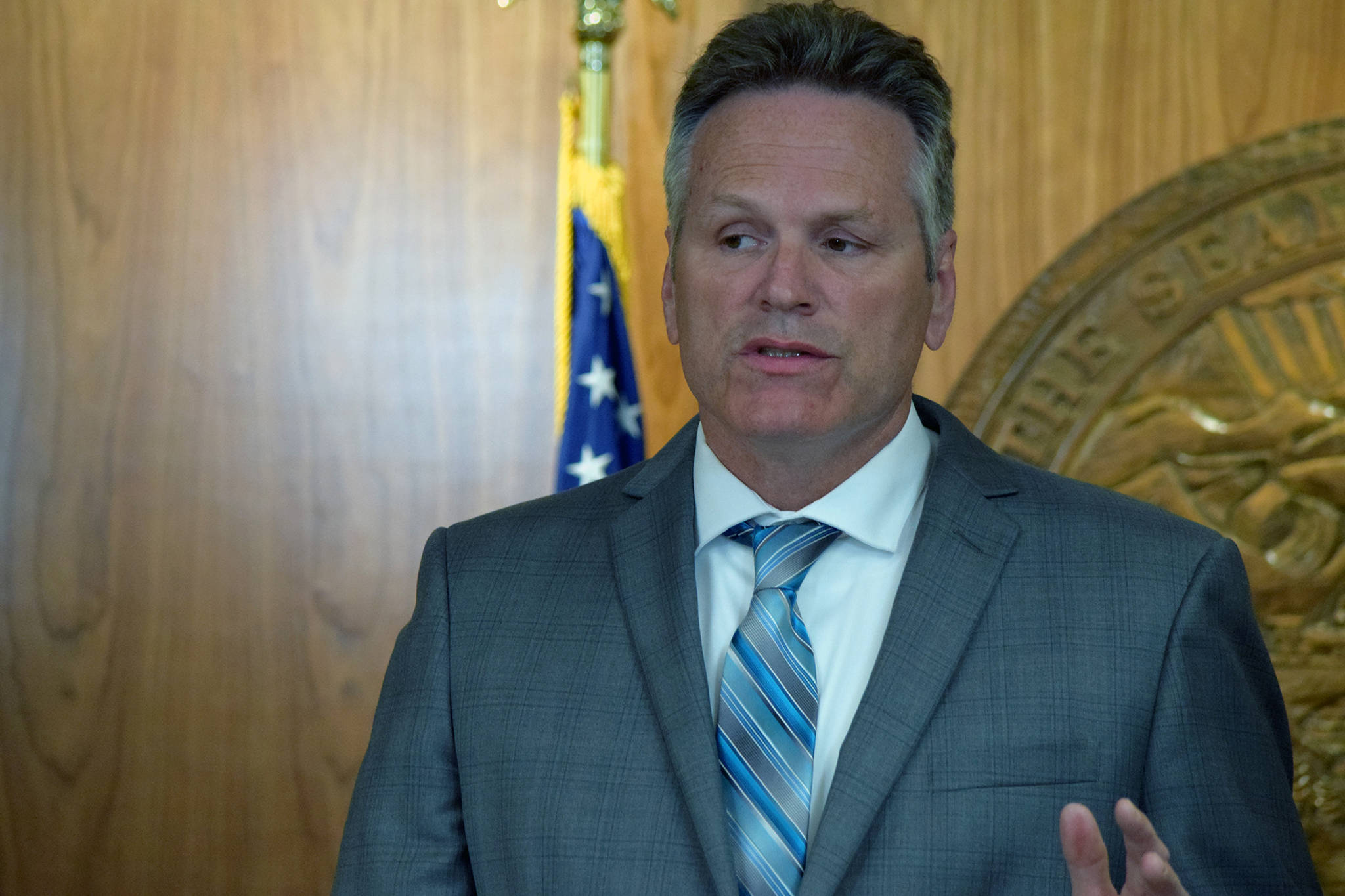Gov. Mike Dunleavy unveiled more than $400 million in cuts to the Legislature-approved budget in the form of line-item vetoes, and said more are on the way.
Dunleavy and Office of Management and Budget Director Donna Arduin discussed the 182 items vetoed by the governor during a press conference Friday at the Capitol that doubled as an announcement of the budget’s signing.
Dunleavy said reductions in spending on the University of Alaska, Medicaid, senior benefits, school bond debt reimbursement, public broadcasting, village public safety office program, the Ocean Ranger program and more are the first half of an envisioned two-year process.
“This is a difficult situation, but I believe everyone realizes something has to be done,” Dunleavy said.
[Live: Coverage of announcement of and response to governor’s vetoes]
The $409 million in vetoes coupled with about $270 million in cuts previously approved in the Legislature’s budget adds up to almost $680 million less in spending than last year, according to the Office of Management and Budget.
The biggest chunk of the $409 million came from the University of Alaska at $130.3 million.
“This budget is going to impact all Alaskans,” Dunleavy said. “The University of Alaska, I have a lot of faith in. I know their leadership. I know a lot of their regents. I believe they’ll be able to work through this. … I don’t think they can be all things to all people, and I think that’s generally speaking for the state of Alaska. We can’t be all things to all people, we don’t have money for that.”
University of Alaska President Jim Johnsen said during a press conference the university does not try to be all things to all people.
“There are many degree plans that we don’t provide,” Johnsen said. “There are programs that are only available at one of our universities.”
University of Alaska Southeast and other community campuses were not directly included in the governor’s veto, but Jim Johnsen said a “devastating” 41-percent cut to state funding would have serious negative effects on the entirety of the university system.
Johnsen said the governor’s veto would likely translate to 1,300 fewer university employees.
“Everything is on the table,” he said. “Forty-one percent of our state funding was vetoed today, campuses, academic programs. It must be on the table.”
[Opinion: University of Alaska requires a higher level of state investment]
A hiring freeze, traveling freeze and 60-day notice of furlough would be effective immediately, Johnsen said.
Legislative override?
He said the university would be working with state lawmakers to push for an override of the veto. An override would need support from three-fourths of the Legislature in a joint session to revert the budget back to the Legislature-approved budget.
Senate Minority Leader Sen. Tom Begich, D-Anchorage, said he “would certainly hope” there’s mass support for overriding the governor’s vetoes in light of the support the Legislature-approved budget received.
.@GovDunleavy announced his drastic vetoes today including cutting @UA_System by 41%, gutting pre-k, and eliminating the senior benefits program. 182 total line item vetoes. The #akleg will continue to lead Alaska from here on out. https://t.co/gWtnAPqMbv— TomBegich (@TomBegich) June 28, 2019
“Only 15 members of the Legislature opposed this budget,” Begich said.
He said he would advise an override of all the vetoes rather than picking and choosing issues to override, but he wasn’t sure what if any tactic might be used.
[With no PFD attached Legislature’s budget goes to governor’s desk]
If the veto is upheld, Johnsen said University of Alaska may need to declare financial exigency at the July 15 Board of Regents meeting. He said that would allow the university to make quick financial decisions.
“It’s very rarely used by public universities, but given a number this big and a need to capture those savings as quickly as we need to there probably isn’t other options,” Johnsen said.
Other big changes
While University of Alaska saw the biggest cut, it wasn’t alone.
Other vetoes included a 50-percent reduction to school bond debt reimbursement totalling $48.9 million, the elimination of the senior benefits program for a $20.8 million reduction, a $50 million cut to Medicaid and repealing the Ocean Ranger program for a reduction of $3.4 million among others.
Multiple questions during the press asked Dunleavy about cutting all funding to the Ocean Ranger program in light of Princess Cruises, a subsidiary of Carnival Corporation, agreeing to pay $20 million for illegal dumping and environmental regulations.
The governor’s response alluded to other ways to actively protect the environment but did not pinpoint a specific replacement for the oversight the program provided.
[Juneau boy goes to Washington, D.C. to advocate for diabetes research]
Dunleavy acknowledged cutting school bond debt reimbursement in half is going to pose a challenge to cities, but said he wasn’t sure if municipalities will need to raise local taxes to make up the difference.
“That depends upon the community,” Dunleavy said. “That depends on their reserves or how they handle their finances. There’s no easy way out of this.”
City and Borough of Juneau City Manager Rorie Watt said there’s no doubt what the veto means for the CBJ, which this year would have to spend about $3.7 million on school bond debt.
“If the governor’s vetoes stand, CBJ will sooner or later be forced to raise taxes and/or reduce our local services,” Watt said in a release. “We are additionally disappointed that the timing of the state’s process forced municipalities to deliberate and set local tax rates for this fiscal year before the state finalizes its budgetary decisions. CBJ will await the legislature’s deliberations and learn whether or not there will be overrides prior to making a local plan to respond to the state budget.”
• Contact reporter Ben Hohenstatt at (907)523-2243 or bhohenstatt@juneauempire.com. Follow him on Twitter at @BenHohenstatt.

